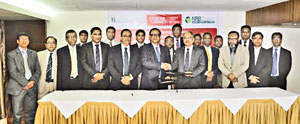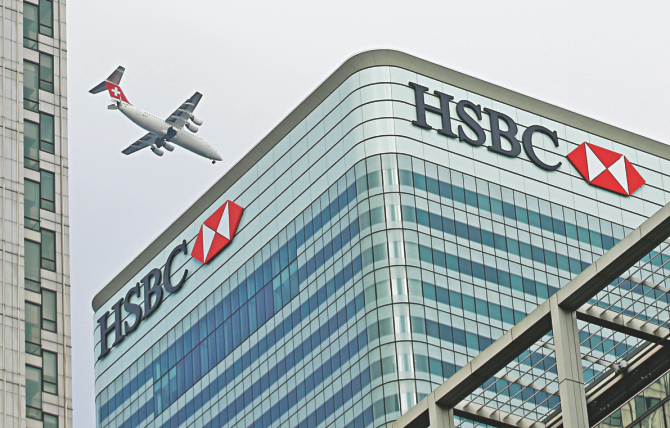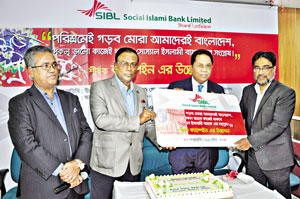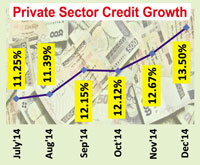Mercantile Bank Limited
 Mercantile Bank Limited has recently commenced Xpress Money Remittance Service at all the branch outlets of NRB Commercial Bank Ltd. An agreement was signed in this regard between NRB Commercial Bank Ltd. and Mercantile Bank Limited. Managing Director & CEO of Mercantile Bank Limited M Ehsanul Haque and Managing Director & CEO of NRB Commercial Bank Ltd Dewan Mujibur Rahman signed the agreement on behalf of their respective banks.
Mercantile Bank Limited has recently commenced Xpress Money Remittance Service at all the branch outlets of NRB Commercial Bank Ltd. An agreement was signed in this regard between NRB Commercial Bank Ltd. and Mercantile Bank Limited. Managing Director & CEO of Mercantile Bank Limited M Ehsanul Haque and Managing Director & CEO of NRB Commercial Bank Ltd Dewan Mujibur Rahman signed the agreement on behalf of their respective banks.
Atiur for more SME financing by banks
Bangladesh Bank Governor Atiur Rahman has strongly advocated more lending to small and medium enterprises (SMEs) by commercial banks for promoting inclusive growth.
The governor said the Basel Rules imposing higher capital charges on bank lending to SMEs are viewed as riskier than larger corporates, and to some extent as a disincentive for commercial banks. However, he noted that the substantially higher interest the banks earn on SME loans is well enough to cover the marginally higher capital charge related costs, reports BSS.
Rahman came up with the recommendation and observation while making some points at a session on promoting SME development at a high-profile conference titled ‘Frontier and Developing Asia: Supporting Rapid and Inclusive Growth’, held yestersday at the JICA Research Institute in Tokyo, Japan, said a BB press release.
The International Monetary Fund (IMF) and Japan International Cooperation Agency (JICA) jointly organised the seminar, inaugurated by JICA president Akihito Tanaka and IMF Deputy Managing Director Naouki Shinohara.
State Minister for Planning and Finance MA manna attended the inaugural session. Ganeshan Wignaraja, Director of Research of the Asian Development Bank Institute (ADBI), presented the keynote paper. The conference was also participated by finance ministers and governors of some Asian countries.
JICA president welcomed participants with a plea for Financial and reducing inequality through SME development.
The governor said non-bank alternative options of financing through global and local non-banking financial institutions (NBFIs) and microfinance institutions (MFIs) are already in varying extents of use.
Factoring or trading in SME receivables, is also helping SMEs in Bangladesh and elsewhere by providing liquidity against their credit sales to upstream buyers in supply chains, reducing their needs for direct financing.
“All these options are feasible and well worth promoting in the menu of options for fuller catering to SME financing needs, suitably adapted to specific country environments. However, in no way do these alternatives absolve commercial banks from their onus of engagement in socially beneficial SME lending on the plea of marginally higher costs from Basel Rules related capital charges”, Rahman said.
He advised that the culture in mainstream global commercial banking needs a major reorientation towards socially responsible inclusive financing, supporting SMEs and environmentally benign ‘green’ output initiatives.
Sharing Bangladesh experience, the governor said SME financing by banks and NBFIs now comprises nearly a third of total credit, which helped uphold domestic output and domestic demand amid global growth slowdown during and following the global financial crisis.
He said the Department for International Development (DFID) of the United Kingdom would launch a partial credit guarantees for SME lending, which would encourage more SME financing by banks.
Besides banks’ lending to SME, the governor suggested deeper fiscal and monetary policy coordination for desired growth of SMEs, which would eventually promote inclusive growth.
Ganeshan Wignaraja in his keynote paper identified the role the Asian SMEs in output and trade activities, and of the financing and other challenges they face in fuller realisation of their potentials.
Swiss raid HSBC in money laundering probe
 A Swiss international aircraft flies past the HSBC headquarters building in the Canary Wharf financial district in east London.
A Swiss international aircraft flies past the HSBC headquarters building in the Canary Wharf financial district in east London.
Swiss authorities yesterday raided the offices of British banking giant HSBC's Swiss unit as part of a money laundering probe into the bank that has been accused of helping clients to dodge millions of dollars in taxes.
The investigation comes just days after HSBC Switzerland found itself at the centre of a global scandal following publication of secret documents claiming it assisted many of its wealthy clientele in thwarting the taxman.
"A search is currently under way in the bank's offices," Geneva's top prosecutors said in a statement.
The search and money laundering investigation were launched "following the recent revelations related to HSBC Private Bank (Switzerland)," they added.
The cache of files, made public in the so-called SwissLeaks case, claimed HSBC's Swiss private banking arm helped clients in more than 200 countries evade taxes on accounts containing $119 billion (104 billion euros).
The files provided details on over 100,000 HSBC clients, including people targeted by US sanctions, suspected arms dealers and drug traffickers.
A wide range of celebrities, politicians and business leaders were also named in the files, although their inclusion does not necessarily imply wrongdoing.
The documents, which were originally stolen by former HSBC IT worker Herve Falciani in 2007, alleged that billions of dollars transited through the bank as customers from around the world tried to dodge the taxman in their home countries or laundered dodgy proceeds through offshore shell corporations.
According to Swiss law, a bank can be held responsible for "aggravated money laundering" if it does not take all the necessary measures to ensure such infractions do not take place within its institution.
Geneva cantonal prosecutor general Olivier Jornot and another top prosecutor, Yves Bertossa, were heading the search and probe against HSBC.
They said the probe initially only targeted the bank itself, but warned that "depending on the evolution, the investigation might be broadened to include physical persons suspected of committing or participating in acts of money laundering."
Anyone found guilty of such crimes could face up to five years behind bars as well as large fines, Geneva judicial authorities told AFP.
Following the SwissLeaks revelations, HSBC's Swiss banking arm insisted it has undergone a "radical transformation" since the period referred to in the files.
HSBC now has "strong compliance controls in place", Franco Morra, the head of HSBC's Swiss unit, told AFP in an email, adding that the revelations are "a reminder that the old business model of Swiss private banking is no longer acceptable".
The SwissLeaks documents were obtained by French newspaper Le Monde and shared via the International Consortium of Investigative Journalists with more than 45 media organisations worldwide.
As soon as the documents were made public on February 9, calls arose for a Swiss probe against HSBC Switzerland, which is already facing prosecution in the United States, France, Argentina, Spain and Belgium. Switzerland had so far only launched an investigation against Falciani.
Falciani himself said last week that the media reports on the documents' contents were based on just a fraction of the files he handed over to French authorities.
"This is only the tip of the iceberg," the 43-year-old Franco-Italian told France's Le Parisien newspaper.
Dubbed the "Snowden of tax evasion" and "the man who terrifies the rich", Falciani remains wanted on data theft charges, but France and Spain have offered him protection by refusing to extradite him to Switzerland.
News:The Daily Star/19-Feb-2015Social Islami bank Limited (SIBL)
 Social Islami bank Limited (SIBL) has inaugurated a campaign on rewarding good jobs at its Principal Branch. Chairman of the bank, Major Dr. Md. Rezaul Haque (Retd.), formally inaugurated the campaign by handing over the campaign replica. The program was presided over by the Managing Director of the bank, Md. Shafiqur Rahman. Deputy Managing Director, A.M.M. Farhad, Deputy Managing Director and Manager of the Principal Branch, Tarik Morshed and all the officers and executives of the branch were present.
Social Islami bank Limited (SIBL) has inaugurated a campaign on rewarding good jobs at its Principal Branch. Chairman of the bank, Major Dr. Md. Rezaul Haque (Retd.), formally inaugurated the campaign by handing over the campaign replica. The program was presided over by the Managing Director of the bank, Md. Shafiqur Rahman. Deputy Managing Director, A.M.M. Farhad, Deputy Managing Director and Manager of the Principal Branch, Tarik Morshed and all the officers and executives of the branch were present.
Lack of investment-friendly environment Bankers fear fall in pvt sector credit growth
 The rising trend in private sector credit growth continued until December last but bankers feared a declining trend in the next months due to the ongoing political turmoil.
The rising trend in private sector credit growth continued until December last but bankers feared a declining trend in the next months due to the ongoing political turmoil.
They have also predicted that the credit growth in the private sector might see a downward trend in January last after showing a rising trend over the last few months.
The sector's credit growth rose to 13.50 per cent in December, 2014 on a year-on-year basis from 12.67 per cent in November last. It was 12.12 per cent in October last.
"The private sector credit growth may fall slightly in the month of January mainly due to the lack of investment-friendly environment," Mizanur Rahman, managing director and chief executive officer (CEO), the Modhumoti Bank Limited told the FE Monday.
The senior banker also said the demand for fresh credit is falling because most businessmen have maintained a 'go-slow' policy to avoid financial risk.
Private sector credit growth increased in December last because of rising demand for trade financing along with higher imports of capital machinery, a senior official of a leading private commercial bank explained.
"The credit demand had picked up during the period under review accelerating the economic activities gradually after a prolonged political gridlock in 2013," the private banker noted.
The total outstanding loans of private sector stood at Tk 5,434.07 billion as of December, 2014 against Tk 4,787.67 billion in the corresponding period of the previous year. It was Tk 4,328.92 billion in December, 2012.
Last December's private credit growth was slightly lower than the target, set by the Bangladesh Bank (BB) earlier.
The central bank earlier set the ceiling for private sector credit growth at 16.5 per cent including foreign borrowing while 14 per cent from local sources for the July-December period of the current fiscal year (FY) 2014-15.
The ceiling for private sector credit growth remained unchanged at 15.5 per cent for the second half of the FY '15 while public sector including the government re-fixed it at 25.3 per cent from 24.8 per cent earlier, according to the current monetary policy statement (MPS).
"We're trying to reduce the interest rate spread aiming to boost investment, particularly in productive sectors," a BB senior official told the FE.
He also said the central bank is ready to increase the ceiling of private sector credit growth in line with requirement.
The country's imports grew by more than 10 per cent in the first half (H1) of the FY '15, due mainly to higher import of capital machinery.
The actual import in terms of settlement of letters of credit (LCs) grew by 10.08 per cent to US$19.59 billion during the July-December period of FY '15 from $17.80 billion in the corresponding period of the previous fiscal.
On the other hand, opening of LCs, generally known as import orders, rose by 13.16 per cent to $21.28 billion in the H1 of FY '15 from $18.81 billion in the same period of FY '14.



